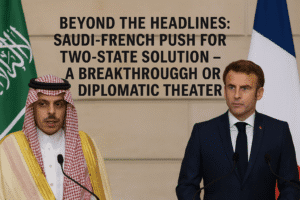Beyond the Headlines: Saudi-French Push for Two-State Solution – A Breakthrough or Diplomatic Theater?
Saudi Arabia and France have jointly presented a detailed UN declaration demanding concrete, timebound steps towards a two-state solution, marking a significant shift from vague diplomacy. The plan requires an immediate Gaza ceasefire, followed by Palestinian Authority-led governance supported by a UN-mandated international force, and explicit Israeli commitments to Palestinian statehood, including a full settlement freeze. Crucially, it pledges sanctions against violent settlers and entities undermining peace.
The notable US and Israeli boycott underscores a deep geopolitical rift, positioning this as an attempt to build overwhelming international pressure without the key parties. Saudi Arabia’s leadership signals a potential hardening of its stance, linking regional normalization directly to Palestinian statehood. While the declaration offers the most specific multilateral blueprint in years, its viability hinges on overcoming fierce Israeli government opposition and the absence of US engagement, making it a high-stakes diplomatic gambit amid ongoing conflict.

Beyond the Headlines: Saudi-French Push for Two-State Solution – A Breakthrough or Diplomatic Theater?
The UN conference hosted by Saudi Arabia and France this week wasn’t just another meeting on the Israeli-Palestinian conflict. It culminated in a bold, detailed declaration demanding concrete action towards a two-state solution, immediately drawing a stark geopolitical line with the notable absence of both the US and Israel. This move represents a significant shift in approach and carries profound implications, demanding deeper analysis than the news cycle often allows.
The Declaration: Substance Over Symbolism?
Gone are the days of vague aspirations. The 7-page document presented by Saudi Foreign Minister Prince Faisal bin Farhan lays out “tangible, timebound, and irreversible steps” – a stark contrast to decades of stalled diplomacy. Its core demands are specific and interconnected:
- End the Gaza War Immediately: This is the declared prerequisite. The relentless conflict must cease as the foundational step.
- Gaza Transition Under Palestinian Authority: Post-ceasefire, a transitional committee under the PA umbrella is mandated to govern Gaza, directly challenging Hamas’s control and aiming to unify Palestinian governance.
- International Stabilization Force: Crucially, the plan calls for a UNSC-mandated international force to maintain order, acknowledging the immense security vacuum. Some states are already signaling readiness to contribute troops.
- Israeli Commitments: Israel is called upon to:
- Issue a clear, public commitment to a sovereign Palestinian state.
- Halt all violence and incitement against Palestinians.
- Freeze all settlement expansion, land confiscation, and annexation activities in the West Bank and East Jerusalem.
- Targeted Sanctions: The declaration commits signatories to impose restrictive measures against violent extremist settlers and those supporting illegal settlements, as well as actors promoting violence or terrorism against the peace process.
- Regional Integration as Catalyst: It explicitly links Israeli security guarantees and normalized regional relations to the establishment of an independent Palestinian state, echoing the pre-October 7th normalization logic but making it contingent on Palestinian statehood.
The Geopolitical Chessboard: Who’s In, Who’s Out
The boycott by the US and Israel is not merely a snub; it’s a fundamental rejection of the conference’s premise and the proposed path. It highlights the central dilemma of Middle East peacemaking: Can significant progress be made without the key parties directly involved? The initiative relies on building overwhelming international pressure, betting that isolation will eventually compel Israeli and US policy shifts.
Saudi Arabia’s leadership role is particularly significant. As a key Arab power and custodian of Islam’s holiest sites, its push for this declaration, including strong language on Jerusalem and settlements, signals a potential hardening of its stance towards Israel without tangible progress for Palestinians. France’s partnership lends crucial European weight, suggesting a potential fracture in the traditionally unified Western position held by the US.
The Roadblocks: Why Skepticism Persists
Despite its ambition, the declaration faces monumental hurdles:
- The Gaza Endgame: Achieving a durable ceasefire acceptable to Israel, Hamas, and the PA remains elusive. Hamas’s future role is a critical unresolved question.
- PA Capacity & Legitimacy: Governing Gaza effectively post-war is a herculean task for the PA, which faces significant challenges to its credibility and capacity in the West Bank.
- Israeli Government Resistance: The current Israeli coalition includes parties fundamentally opposed to Palestinian statehood and committed to settlement expansion. Securing the demanded public commitment seems improbable without major political change.
- US Abstention: Without active US diplomatic muscle and potential pressure on Israel, implementation lacks its most historically effective lever.
- Enforcement Mechanisms: While sanctions against settlers are proposed, the practical application and effectiveness against deeply entrenched actors are uncertain.
Beyond Diplomacy: The Human Imperative
The declaration forcefully states: “Only by ending the war in Gaza, releasing all hostages, ending occupation, rejecting violence and terror, realizing an independent, sovereign, and democratic Palestinian State… can normal relations and coexistence… be achieved.” This framing recognizes the inescapable linkage between Palestinian self-determination and lasting regional security. It moves beyond managing the conflict towards resolving its root causes.
Conclusion: A Necessary Gambit in a Stalemated Process?
The Saudi-French initiative is a high-stakes diplomatic gamble. It offers the most concrete multilateral blueprint for a two-state solution presented in years, challenging the international community to move beyond rhetoric. However, its success hinges on overcoming the vehement opposition of the two actors whose participation is ultimately indispensable: Israel and its primary ally, the United States.
Whether this declaration becomes a catalyst for renewed, pressured negotiations or a testament to the deep international divisions on the issue depends on the willingness of other nations to endorse it vigorously and the unpredictable dynamics of the ongoing war and regional politics. It may not bring immediate peace, but it forcefully reasserts the two-state solution as the only viable framework on the international stage and demands accountability from all parties in a way that cannot be easily ignored. The coming weeks, as nations decide whether to sign on before the UNGA session ends, will be a crucial indicator of its potential resonance.
You must be logged in to post a comment.